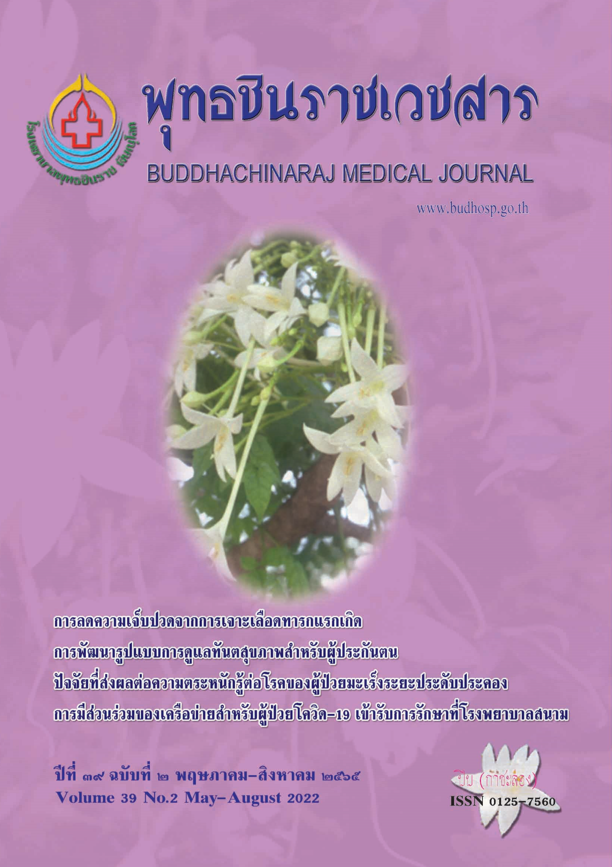ปัจจัยที่ส่งผลต่อความตระหนักรู้ต่อโรคของผู้ป่วยมะเร็งระยะประคับประคอง
ปัจจัยที่ส่งผลต่อความตระหนักรู้ต่อโรคของผู้ป่วยมะเร็ง
คำสำคัญ:
ความตระหนักรู้ของผู้ป่วย, ความตระหนักรู้ต่อโรค, ความตระหนักรู้ต่อพยากรณ์โรค, ความตระหนักรู้ต่อเป้าหมายการรักษา, การดูแลประคับประคองบทคัดย่อ
ความตระหนักรู้ต่อโรคของผู้ป่วยนั้นสำคัญต่อประสิทธิผลของการพูด คุยเรื่องเป้าหมายการรักษาในการดูแลประคับประคอง แต่ยังขาด ความรู้เกี่ยวกับปัจจัยที่เกี่ยวข้องกับความตระหนักรู้ของผู้ป่วย การ ศึกษาแบบย้อนหลังครั้งนี้ จึงมีวัตถุประสงค์เพื่อประเมินปัจจัยที่ส่งผล ต่อความตระหนักรู้ของผู้ป่วยมะเร็งระยะประคับประคอง โดยศึกษา ข้อมูลย้อนหลังจากเวชระเบียนผู้ป่วยมะเร็งที่ได้รับการส่งปรึกษาการ ดูแลแบบประคับประคองที่โรงพยาบาลลำปางระหว่างปี พ.ศ. 2560- 2564 ข้อมูลที่ศึกษา ได้แก่ ข้อมูลส่วนบุคคลและข้อมูลทางคลินิก ของผู้ป่วย ชนิดของมะเร็ง วันที่ได้รับการวินิจฉัยมะเร็ง วันที่ได้รับการ ส่งปรึกษาการดูแลแบบประคับประคอง และระดับความสามารถในการ ช่วยเหลือตัวเอง (PPS score) วิเคราะห์ความเกี่ยวข้องระหว่างข้อมูล ส่วนบุคคลของผู้ป่วยกับความตระหนักรู้ต่อโรค ระยะและการพยากรณ์ โรค รวมทั้งเป้าหมายของการรักษาด้วยสถิติพหุคูณถดถอยโลจิสติก ผลการศึกษาพบว่าค่า PPS score สูงและระยะเวลาที่วินิจฉัยมะเร็ง จนถึงได้รับการรักษาแบบประคับประคองตั้งแต่ 3 เดือนขึ้นไปเพิ่ม โอกาสของความตระหนักรู้ของแต่ละปัจจัยอย่างมีนัยสำคัญทางสถิติ ขณะที่การมีอายุเพิ่มขึ้นแต่ละปีลดความตระหนักรู้ของแต่ละปัจจัย อย่างมีนัยสำคัญทางสถิติ นั่นคือการปรึกษาการดูแลประคับประคอง โดยเร็วเพิ่มความตระหนักรู้ของผู้ป่วยมะเร็งยิ่งกว่านั้นในผู้ป่วยที่ยังไม่ ตระหนักรู้หากได้คุยซ้ำหลังการวินิจฉัยมะเร็ง 3 เดือนอาจช่วยให้ ความตระหนักรู้ดีขึ้น
เอกสารอ้างอิง
Ranganathan A, Gunnarsson O, Casarett D. Palliative care and advance care planning for patients with advanced malignancies. Ann Palliat Med 2014;3(3):144-9.
Boyd K, Mason B, Kendall M, Barclay S, Chinn D, Thomas K, et al. Advance care planning for cancer patients in primary care: a feasibility study. Br J Gen Pract 2010;60(581):e449-58.
Singer PA, Robertson G, Roy DJ. Bioethics for clinicians: 6. Advance care planning. CMA J 1996;155(12):1689-92.
Teno JM, Nelson HL, Lynn J. Advance care planning. Priorities for ethical and empirical research. Hastings Cent Rep 1994;24(6):S32-6.
Fleuren N, Depla MFIA, Janssen DJA, Huisman M, Hertogh CMPM. Underlying goals of advance care planning (ACP): a qualitative analysis of the literature. BMC Palliat Care 2020;19(1):27. doi: 10.11 86/s12904-020-0535-1BMC Palliat Care 2020;19:article No.27
Schichtel M, Wee B, Perera R, Onakpoya I. The effect of advance care planning on heart failure: a systematic review and meta- analysis. J Gen Intern Med 2020;35(3):874-84.
Maracle R. Advanced care planning: improving quality of life. DNA Reporter 2016;41(3):10-1.
Detering KM, Hancock AD, Reade MC, Silvester W. The impact of advance care planning on end of life care in elderly patients: randomised controlled trial. BMJ 2010;340:c1345. doi: https://doi.org/10.1136/bmj.c1345
Bischoff KE, Sudore R, Miao Y, Boscardin WJ, Smith AK. Advance care planning and the quality of end-of-life care in older adults. J Am Geriatr Soc 2013;61(2):209-14.
Phungrassami T. Advance care plan [Internet]. 2011 [cited 2021 Nov 11]. Available from: http://budnet.org/sunset/node/213
Temel JS, Greer JA, Admane S, Gallagher ER, Jackson VA, Lynch TJ, et al. Longitudinal perceptions of prognosis and goals of therapy in patients with metastatic non-small-cell lung cancer: results of a randomized study of early palliative care. J Clin Oncol 2011;29(17):2319- 26.
Epstein AS, Prigerson HG, O'Reilly EM, Maciejewski PK. Discussions of life expectancy and changes in illness understanding in patients with advanced cancer. J Clin Oncol 2016;34(20):2398-403.
Weeks JC, Cook EF, O'Day SJ, Peterson LM, Wenger N, Reding D, et al. Relationship between cancer patients' predictions of prognosis and their treatment preferences. JAMA 1998;279(21):1709-14.
Mon SW, Zu WWM, Maw MM, Win H, Thant KZ, Yang G, et al. Awareness of and preference for disease prognosis and participation in treatment decisions among advanced cancer patients in Myanmar:results from the APPROACH study. Asia Pac J Clin Oncol 2021;17(1):149-58.
Tang ST, Liu TW, Tsai CM, Wang CH, Chang GC, Liu LN. Patient awareness of prognosis, patient-family caregiver congruence on the preferred place of death, and caregiving burden of families contribute to the quality of life for terminally ill cancer patients in Taiwan. Psycho-Oncol 2008;17(12):1202-9.
Roll IJ, Simms V, Harding R. Multidimensional problems among advanced cancer patients in Cuba: awareness of diagnosis is associated with better patient status. J Pain Symptom Manage 2009;37(3):325-30.
Chan WC. Being aware of the prognosis: how does it relate to palliative care patients' anxiety and communication difficulty with family members in the Hong Kong Chinese context? J Palliat Med 2011;14(9):997-1003.
Ray A, Block SD, Friedlander RJ, Zhang B, Maciejewski PK, Prigerson HG. Peaceful awareness in patients with advanced cancer. J Palliat Med 2006;9(6):1359-68.
Leung KK, Chiu TY, Chen CY. The influence of awareness of terminal condition on spiritual well-being in terminal cancer patients. J Pain Symptom Manage 2006;31(5):449-56.
Clare L, Markova IS, Roth I, Morris RG. Awareness in Alzheimer's disease and associated dementias: theoretical framework and clinical implications. Aging Ment Health 2011;15(8):936-44.
World Health Organization. Palliative Care 2020 [Internet]. 2020 [cited 2021 Nov 27]. Available from: https://www.who.int/newsroom/fact-sheets/detail/palliative-care
Downing GM. Questions & Answers (Q&A), Instructions & definitions for use of Palliative Performance Scale (PPSv2). [updated 2020 Jul 24, cited 2021 Nov 27]. Available from:https://victoriahospice.org/wp-content/uploads/2020/08/PPSv2-QA-Instructions-and-Definitions-updated-July-2020.pdf
StataCorp LLC. Released 2013. Staff Stata Statitical Software, version 13. College Station, Texas State, USA: Stata Corp LLC; 2013.
Freedman DA. On the so-called "Huber sandwich estimator" and "robust standard errors". Am Stat 2006;60(4):299-302.
Chou W-C, Hung Y-S, Kao C-Y, Su P-J, Hsieh C-H, Chen J-S, et al. Impact of palliative care consultative service on disease awareness for patients with terminal cancer. Support Care Cancer 2013;21(7):1973-81.
Mitchell G. Palliative care: a patient-centered approach. London, England: Radcliffe Publishing; 2008.
Seow H, Bainbridge D. A review of the essential components of quality palliative care in the home. J Palliat Med 2018;21(S1):S37-44.
Kubler-Ross E, Kessler D. On grief and grieving: finding the meaning of grief through the five stages of loss. New York City, New York State: USA: Simon and Schuster; 2005.
Narayanan V, Bista B, Koshy C. 'BREAKS' protocol for breaking bad news. Indian J Palliat Care 2010;16(2):61-5.
World Health Organization. Regional Office for the Western Pacific report. International Symposium on People-Centred Health Care: Reorienting Health Systems in the 21st Century; 2007 Nov 25; Tokyo, Japan. [cited 2021 Nov 27]. Available from: https://apps.who.int/iris/handle/10665/207889
Starfield B. Primary care and equity in health: the importance to effectiveness and equity of responsiveness to peoples' needs. Human Soc 2009;33(1-2):56-73.
World Health Organization. Quality of care:a process for making strategic choices in health systems [Internet]. 2006. [cited 2021 Nov 27]. Available from: https://apps.who.int/iris/handle/10665/43470
ดาวน์โหลด
เผยแพร่แล้ว
ฉบับ
ประเภทบทความ
สัญญาอนุญาต
ลิขสิทธิ์ (c) 2022 พุทธชินราชเวชสาร

อนุญาตภายใต้เงื่อนไข Creative Commons Attribution-NonCommercial-NoDerivatives 4.0 International License.






